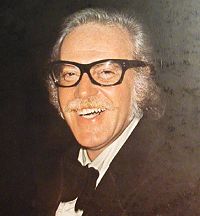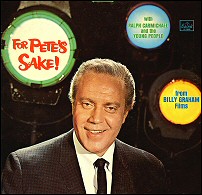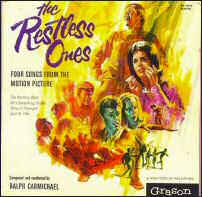 Ralph Carmichael |
 Ralph Carmichael |
Ralph Carmichael - Born 27 May 1927, Quincy, Illinois
What most space age pop fans hear of Ralph Carmichael's work is just the tip of the iceberg. What lies beneath the surface, hidden to those listeners who fear to dive into icy waters marked by that dreaded label, Christian music, is a prodigious oeuvre as impressive and influential in its own genre as Duke Ellington's was in jazz. And just as the genius of Ellington was shown in the ease with which he moved in and out and around different styles and types of music, so Carmichael has defied stereotypes by moving back and forth between sacred and secular music.
A pastor's son, Carmichael lived in Illinois and North Dakota before moving with his family to southern California in his teens. Carmichael's father encouraged his musical talents, paying for private lessons beginning at the age of four and letting him venture into a variety of instruments. And he never censored his son's interest in popular as well as classical and gospel music.
Carmichael was born again in 1944, and enrolled in Southern California Bible College. While in college, he began appearing on a local television station leading a big band playing gospel tunes on a show called "The Campus Christian Hour," and won an early Emmy in 1949. After graduating, he went to work as musical director at an L.A. Baptist church, and began a long-standing partnership with World Wide Pictures, the motion picture arm of Billy Graham's crusades. By the late 1970s, Carmichael had scored over 20 feature films for the studio, including "His Land," a 1970 drama starring born again British rock star Cliff Richard.
The early World Wide scores were recorded at Capitol Records' studios in Hollywood, and in the late 1950s, Carmichael began taking jobs arranging, composing, and conducting for Capitol's pop artists. One of his earliest works was a Christmas album with Nat King Cole that became one of the biggest sellers of that seasonal genre. Over the next few years, Carmichael wrote and arranged pop tunes for Peggy Lee, Bing Crosby, Sue Raney, Rosemary Clooney, Perry Como, and even Stan Freberg. He even served as the musical director for "I Love Lucy" in the show's waning years and composed for "Bonanza" and "The Danny Kaye Show."
He also became acquainted with another Capitol artist, Stan Kenton, who had a similar disregard for genre stereotypes. Carmichael began writing for Kenton as his popularity had begun to fade, and became one of his right hand arrangers throughout his many experiments in the 1960s--including the big band take on the rock musical, "Hair," described by more than one Kenton fan as "his most embarassing record ever."
Throughout the 1960s, Carmichael also worked with one of the decade's most successful space age pop performers, pianist Roger Williams. He arranged over 20 albums for Williams and earned a gold record credit for "Born Free." Williams' label, Kapp, even signed Carmichael to record one of his very few pop albums under his own name, Man With a Load of Music.
Yet all these pop music credits are dwarfed by the range and size of his work in Christian music. He has written and recorded with virtually every type of ensemble imaginable, from large choirs and string orchestras to rock combos, from big bands to to Moog synthesizer to small a capella groups. He has composed songs, hymns, carols, symphonies, chorales, and suites. Several of his hymns have become standards--"He's Everything to Me" has been recorded by Elvis and other pop singers. His folk-rock Christian church musicals of the late 1960s played a major role in the introduction of pop music styles into Christian music and church services. He went on to form his own label, Light Records, and worked with Andrae Crouch and others to create what is now known as contemporary Christian music.
In the 1990s, after organizing a very successful touring Christian musical, "Young Messiah," Carmichael returned to the big band format and recorded a number of CDs of popular and gospel tunes with "The Ralph Carmichael Big Band" on the Brentwood label. Now in his seventies, Carmichael continues to create music: "I don't know how many notes I've got left in my pencil, but I know I want them used to glorify God and present His message to the world."
(December 15, 2002)
Ralph Carmichael is considered by many to be the father of contemporary Christian music. He has served as president of the Gospel Music Association, been inducted into the GMA Hall of Fame, was founding president of Light Records and Lexicon Music, and has arranged or produced six musicals, 75 television and motion picture scores (including The Cross and the Switchblade) many songs and more than 200 records. He is a Dove Award and Emmy Award recipient. Carmichael spoke to Jim Linzey about his life and ministry.
PE: What were your earliest influences?
CARMICHAEL: I’m most grateful for my parents, Richard and Adele Carmichael, for bringing me up in the church. I’m proud I’m a preacher’s kid and for what my folks gave me as a spiritual heritage. I’ve thanked God a thousand times over for the Bible teaching I received growing up in the Carmichael household. We had family altar every day and church almost every night.
PE: How did you come to know Jesus Christ as your Savior?
CARMICHAEL: Every time my parents gave an altar call, I responded. But while attending Southern California Bible College [now Vanguard University], I realized that I needed to allow Jesus Christ to become the supreme Lord of my life. I made a commitment to God that if He would make my musical dreams come true, I would give them all back to Him.
PE: What led you into conducting?
CARMICHAEL: When I was a student at Vanguard University in 1949, the school raised funds for uniforms and instruments for the band I assembled. President Harrison allowed us to go on television with a program called The Campus Christian Hour. After 50 consecutive weeks on the air we won an Emmy Award.
PE: What were some high points in your involvement with contemporary Christian music?
CARMICHAEL: In 1966, I told my friend Jarrell McCracken, founder and president of Word Records, that I believed the evangelical status quo was counterproductive to evangelism. If something wasn’t done to change the trend, I felt the church would suffer. I suggested starting a new record label called Light and releasing all the experimental music on it. In 1968 we released the record I Looked For Love and Andrae Crouch’s Gonna Keep On Singing followed by many other records. In the 1970s we released contemporary Christian programming to nationwide radio. In 1975, we produced and presented Jimmy Owens’ musical If My People to the National Religious Broadcasters Convention, gaining tremendous support for the new sound. Lexicon’s New Church Hymnal in 1976 contained traditional and contemporary music. Congregations of all denominations were singing the new music, something I had prayed for and dreamed of all my life.
PE: Is contemporary Christian music a new idea?
CARMICHAEL: In the 1700s and 1800s, poets wrote many of our traditional hymns, combining the unchanging message with popular secular melodies. And they were sternly criticized. The musical “pop” style of the 1800s is what we now call traditional, though it did not come from within the church.
The same process occurred from 1900 to the 1950s. Be it jazz, blues, ragtime, ballad, marches or what we call “traditional,” these musical expressions share one characteristic — they did not originate within the church.
PE: What is your motivation for introducing new forms of musical expression into the church?
CARMICHAEL: Psalm 33:3 and Revelation 14:3 admonish us to sing a new song. The message we must share is timeless and unchanging, but if we are to communicate it to a changing world, the medium must be constantly changing.
Garden of the Heart 1958 Real oldie!

For Pete's Sake Sacred 1967
Movie soundtrack
Tell It Like It Is Light 1969
Tell It Like It Is
A New Mind
The Electric Symphony Light 197?
102 Strings
A Carmichael Concert
102 Strings Vol. 2
I Looked For Love Light 197?
The Savior is Waiting
Sometimes I Just Feel It This Way Light 197?
Natural High Light 1970
The Piano... I Remember Vol. 1 Light 197?
Hymns At Sunset Light
Our Front Porch Light 1970
Ralph Carmichael & the Young People - Young Light 197?
New Vibrations Light 1970
I'm Here, God's Here, We Can Start Now Light 1973
His Land Light 1970
Soundtrack album from the film of the same name, with singing by Cliff Richard, narration by Cliff Barrows & orchestration from Ralph Carmichael & The Ralph Carmichael Chorus.
Requiem For A Nobody Light 1971
It's Getting Late Light 1972
Have a Nice Day Light 1972
Share Light 1974
The Ralph Carmichael Songbook Impact 1974
New Wine Light 1974

The Restless Ones Sacred 1976
Beautiful Garden of Prayer Word 1976
Christmas Joys Light